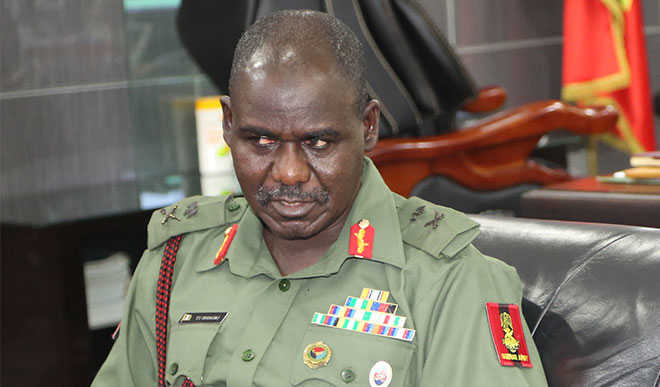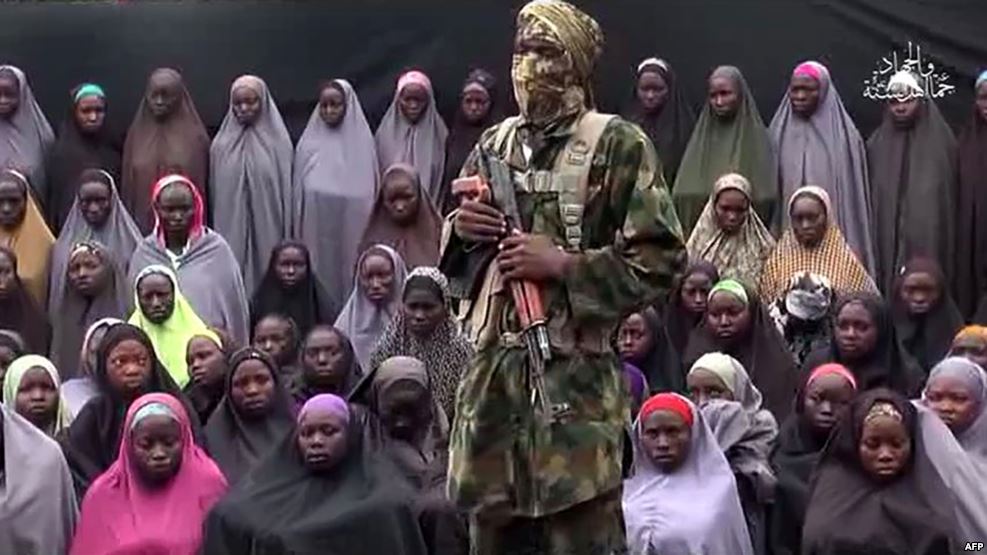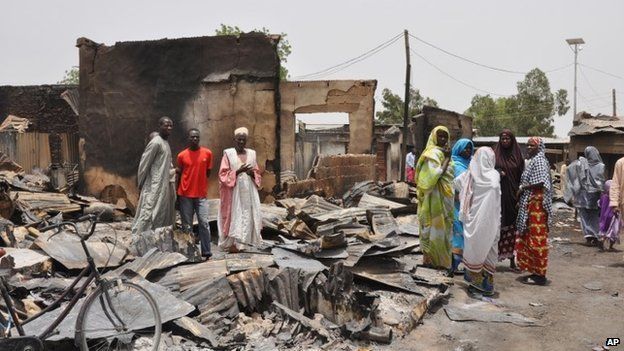
Last week, Boko Haram extremists released a video threatening Nigerian President Muhammadu Buhari, Army Chief of Staff Lt. Gen. Tukur Yusuf Buratai, and other top officials in a violent warning to fear the group’s renewed strength.
Buratai just shrugged it off. “They warn they are very strong, which is a lie,” Buratai told Foreign Policy in an exclusive interview last week at a hotel in Northern Virginia, where he was touting his troops’ successes against the militant group while on a speaking tour in the United States. “They don’t have that ability that they are claiming.”
Boko Haram has killed tens of thousands of people and displaced millions more in recent years, sparking a refugee and security crisis across the Lake Chad region. Since Buratai took over as the army’s top ranking officer last July, the Nigerian military has repeatedly claimed a technical victory over the group, which once controlled a territory the size of Belgium and is now largely confined to hideouts in the Sambisa Forest, which stretches some 23,000 square miles through Nigeria’s northeast.
“You can beat your chest and say, ‘Yes, we’ve defeated the Boko Haram insurgents to the extent that they are not holding or administering any territory in Nigeria right now as they were before,’” Buratai told FP. He also spoke at the Atlantic Council think-tank in Washington and the Virginia Military Institute three hours south of the capital, but said he did not meet with any defense officials at the Pentagon.
Buhari ran for office in 2015 on a platform that promised increased security following Boko Haram’s rise, winning him popularity among civilians frustrated by former President Goodluck Jonathan’s unwillingness to take the militants seriously until they had wreaked havoc across the country’s predominantly Muslim northeast.
A regional taskforce made up of troops from Nigeria, Niger, Benin, Cameroon, and Chad helped beat Boko Haram out of many of its strongholds. But once the group began to lose its grip on territory in early 2015, it aggressively shifted to more asymmetrical warfare: For months, militants regularly launched suicide attacks in and around Nigeria, often sending young girls into markets to detonate themselves.
According to Action on Armed Violence, a U.K-based nonprofit that tracks conflict around the world, suicide attacks killed nearly 650 civilians in Nigeria between January and July of last year alone. Fear of those attacks and distrust that the Nigerian military could permanently keep Boko Haram out of villages where they regularly executed or forcibly recruited civilians added to the region’s already growing migration crisis. Maiduguri, the capital of Nigeria’s Borno State, is now home to nearly 1.7 million displaced people, many of whom are living in overcrowded camps where food and medical aid is scarce, if accessible at all.
For that reason, Jennifer Cooke, director of at the Africa program at the Washington-based Center for Strategic and International Studies, said Buhari was wrong to claim even a technical victory, “because defeat and victory at this point are kind of meaningless.”
“I do think they have been successful in weakening Boko Haram, but they’re still dealing with asymmetrical attacks,” she said.
During an hour-long conversation with FP, Buratai said although he believes Nigeria’s armed forces were prepared for Boko Haram’s eventual shift to more civilian bombings, he conceded they “never envisaged it to be at that scale.” He declined to estimate how many militants now belong to the group, but said their increased reliance on propaganda is indicative of its inability to effectively influence the local population.
He believes that the extremists have proven themselves so violent that very few civilians would now willingly join them, despite the continued economic challenges that have plagued Nigeria’s isolated northeast — and prompted some loyalty to the extremists — since the group first turned violent around 2009.
Buratai said the military’s ability to oust Boko Haram from its strongholds in the north has “restored the confidence of Nigerians in their military.” Under his watch, the Nigerian Army has begun live-tweeting its successes to improve transparency about its operations and counter Boko Haram’s propaganda narrative that it continues to threaten the state’s military.
The social media campaign offers a glimpse into the brutality of the fight against both Boko Haram and the Niger Delta Avengers, a rebel group that regularly attacks the country’s oil pipelines further south.
This month alone, @HQNigerianArmy has tweeted multiple photos of bloody corpses that allegedly belong to captured Boko Haram members.The account recently tweeted that the military had fatally wounded Boko Haram leader Abubakar Shekau, who they have claimed to kill multiple times in recent years and whose leadership came into question this summer as Boko Haram continues to try to rebrand itself as the Islamic State’s West Africa caliphate. But Buratai told FP he believes Shekau was likely killed as far back as 2013, and that today he just has many “clones” who try to convince the public he is still alive and well.
“Civilians know he was killed,” he said.
In one recent tweet, a photo of a severed leg is accompanied by a caption describing it as belonging to a female suicide bomber neutralized by government troops. In another, a man wearing ripped camouflage pants lies dead next to his motorbike, one hand resting on his rifle. The caption claims the photo portrays the aftermath of Nigerian troops clearing out Boko Haram hideouts.
“As soon as we have any encounter, or we carry out any operation within the theater, we make sure we get it across to our people,” Buratai said.
But critics maintain that lack of due process for Boko Haram suspects continues, and that men who willingly joined the group and those who were forcibly conscripted are often treated as equals in crowded detention centers.
“Torture and other ill-treatment by police and military remained pervasive,” Amnesty International said in its 2015-2016 report on Nigeria, noting that Boko Haram suspects “continued to die in detention.”
“You’ve got thousands of people surrendering and thousands of people being captured, so they may be overwhelmed in terms of sorting out culpability,” Cooke said. But, she said, Nigeria’s military “do themselves no favors by making the default throwing people in prison without any process of any kind.”
When U.S. Secretary of State John Kerry visited Nigeria last month, he cautioned government and religious leaders against being “tempted to crack down on everyone and anyone who could theoretically pose some sort of a threat.”
The United States has provided some aid to the region in its fight against the terrorist group, including U.S. drones that fly reconnaissance missions from a base in northern Cameroon. But the Nigerian government has repeatedly expressed frustration with a U.S. law widely known for its author, Sen. Patrick Leahy (D-Vt.), which prevents Washington from providing material support to military units that have committed human rights violations. Buratai defended his soldiers’ human rights record in his conversation with FP, calling Nigeria’s military “one of the most human rights-observant” in the world.
“We want to believe it can still get better, there is hope,” he said of the U.S.-Nigeria relationship. “We still hope that it will be better than what we are doing now.”
But Buratai found himself at the center of a particularly violent episode last December, when Shiite protesters in the northern city of Zaria surrounded his convoy in what the military insisted was an assassination attempt against him. Human Rights Watch reported that the Nigerian military opened fire on the protesters, who belonged to the Islamic Movement of Nigeria, potentially killing hundreds of civilians. It sparked a major diplomatic row between Abuja and Tehran, which has historically provided support to the Nigerian Shiite community.
“At best it was a brutal overreaction, and at worst it was a planned attack on the minority Shiite group,” Daniel Beleke, Africa director at Human Rights Watch, said in December.
When pressed to explain how the protest escalated so quickly, Buratai told FP that he feared for his life and that his troops acted in self-defense. Many of the protesters were killed, he claimed, by their own Molotov cocktails.
And according to his account, the protesters were the first to turn violent.
“What they did that day, there is no way any country would accept that behavior,” he said. “That’s complete rebellion.”

![Wakil... "I have been in this, trying to bring peace between the government and Boko Haram, for the past seven years. I am known to the media, I am known to Nigeria, I have had meetings with them [the army] and told them what the boys [Boko Haram] are saying they want them to do so that this ends. They should know that I am a good asset to end this problem..."](https://www.guardiannewsusa.com/wp-content/uploads/2016/08/201461512958422734_20.jpg)

